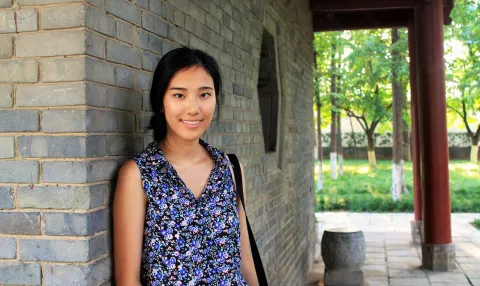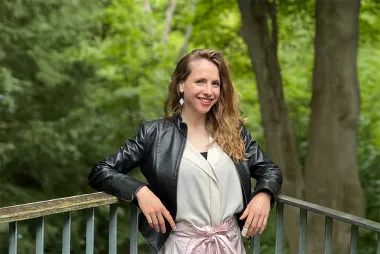"I believe that if we want to inspire and nurture innovative minds, we need to value individuality and support students in taking risks."

Dolma Tsundu
- Degree:
- Bachelor of Applied Science
- Grad year: 2020
- Program:
- Campus: Vancouver
During her degree, Dolma has pursued projects and initiatives that promote equity and freedom for diverse groups in Canada and around the world. In 2018, she was selected as the Canadian Engineering Memorial Foundation’s Ambassador for British Columbia for her work with underrepresented groups in engineering. She was also selected as a Daughters of the Vote Delegate in 2019, where she represented her federal riding in the House of Commons of Canada. She was later awarded a Rosemary Speirs Leadership Grant from the Government of Canada’s Department for Women and Gender Equality. With this grant, she initiated the “Activism Through Technology and Art” collective, which raises awareness for humanitarian issues. Currently, she is the CEO and Co-Founder of Flutter Wear (flutterwear.com), a company whose technology promotes a positive and informed pregnancy experience for expectant mothers. Her team has received funding from UBC’s Faculty of Medicine, the Royal Bank of Canada, the Medical Device Development Center, the Canadian Medical Association, and Innovation UBC. She also pitched this project at the Startup of Holland Competition in the Netherlands where it received 1st place. Recently, Dolma was selected as the 2020 Engineers Canada Gold Medal Student Award recipient.
Why did you choose to go into your field of study at UBC?
While I had always known that I was drawn to the wonders of science and the emotional resonance of the arts, I wanted to be able to create something tangible out of the thoughts, feelings, and ideas that live inside my mind. But most of all, I wanted to do so in a powerful and meaningful way that could enable people to live with the freedom, happiness, and health they desire. Engineering has proven to be a path through which this is possible.
What has made your time at UBC memorable?
The highlights of my time as a student include co-founding Flutter Wear, initiating the Activism Through Technology and Art Collective, directing Women in Engineering UBC, and serving as a Teaching Assistant for APSC 100/101. During my semester abroad, the highlights include re-designing a national monument in the Netherlands for greater wheelchair accessibility, creating an interactive art installation that was exhibited in the Kunsthal contemporary art museum, and inventing a rehabilitation device that was featured at Dutch Design Week. Looking back, these are all things that I never would have imagined myself being able to do at the beginning of my degree. It has taken small, incremental steps of pushing myself outside of my comfort zone, but I’m incredibly grateful that I did. However, without the support of incredible people I have met along the way, none of this would have ever been possible.
What has been your most valuable non-academic experience studying at UBC?
The most valuable non-academic experience was co-founding Flutter Wear. I am passionate about increasing women's autonomy. Women’s health has long been overlooked and stigmatized in research and innovation. Additionally, the right to make informed decisions about our own bodies has been a subject of controversy across the world and throughout history. However, digital technologies are increasing access to health services and education, while enabling us to personalize care. Allowing my passions to intersect with my studies organically gave me a sense of purpose and direction. It also opened up new doors I never would have imagined for myself - such as starting my own company. However, recognizing the potential impact of my projects, finding inspiring teammates, and serving a mission I care deeply about has led me there unexpectedly.
Tell us about your experience in your program. What have you learned that is most valuable?
Integrated Engineering helped me to see myself first as an individual and then as an innovator. I was never restricted nor defined by my degree. Since I had the freedom to tailor my degree, it pushed me to think critically about my interests and dreams. The program encouraged me to come up with my own ideas and offered the breadth of knowledge required to see them through to reality. As a result, I have had the opportunity to work on several technical projects that widened the boundaries of my knowledge and creativity.
How are you applying the skills you learned through your studies at UBC?
The greatest thing I will take away from my degree is the courage and ability to bring individuals together to tackle issues we care about. I have heard people say that engineering teaches you an approach to solving problems. However, for me, the greatest thing I will carry with me is the mentality to rise and say, "I am not ok with this, so I am going to bring people together to do something about it." Recognizing the power of a dedicated team, as well as the value of every individual’s contributions to your team, will prove to be a critical skill.
What advice would you give a student entering your degree program?
I believe that if we want to inspire and nurture innovative minds, we need to value individuality and support students in taking risks. I have struggled with the culture of conformity that exists within engineering. However, by pursuing projects and initiatives that were aligned with my values and passions (but deviated from the norm), I began to realize that the facets of my life that made me feel out of place, or seemed completely unrelated to engineering, were actually my strengths. Therefore, I would challenge engineering students to define themselves by what they value and care for as an individual, before defining themselves by their degree. Build the courage to stay true to what you believe in and don’t let go of what you love; the rest will follow.
Where do you find your inspiration?
From a young age, I was drawn to the natural world and the arts as a way to explore my surroundings, understand my emotional experiences, and express myself freely to others. I believe that nature represents the nexus of mystery, beauty, and ingenuity. I continue to experience child-like curiosity, inspiration, and solace when I immerse myself in it. I also find inspiration from the stories of others which I believe are expressed most powerfully through creative mediums — whether it be song, dance, painting, poetry, or film. Over the course of my life, I have found inspiration from the communities I have been privileged to become a part of — one being the Special Olympics. By embracing facets of my own life, and exposing myself to the lived experiences of others that were very different from my own, I learned the importance of being intentional not only in how I choose to use my voice and my knowledge, but also for whom I choose to use it for.
What are your immediate and/or long-term plans for the future?
I am currently pursuing Flutter Wear to improve pregnancy experiences and outcomes through digital health innovation. I am also part of the 2020 cohort of the Cansbridge Fellowship, a global leadership program designed to help young Canadians innovate across borders. In the long-term, I hope to contribute to initiatives that promote equity, freedom, and justice for diverse groups in Canada and around the world. Regardless of the capacity in which I will do so, I am committed to continuing to learn, grow, and adapt to safeguard the planet we inhabit, mobilize the people around me, and ultimately, take on the global challenges we face as humanity.
What are your future plans to make a difference in our world?
I hope to make a difference by working on projects that transcend international boundaries and transform people's minds, hearts, and lives for the better. I would especially like to create experiences with art and/or technology that lead to greater awareness and concern for how one’s actions can impact others. I have found that I am the most driven, creative, and inspired when I work on projects that focus on lifting minority women, people with disabilities, and people living in poverty. However, regardless of where I will be or what I will be doing, I hope to be someone who challenges herself, someone people can look to for support, and someone who chooses to rise for others.
How has your identity informed your academic and professional experiences within your field at UBC and beyond?
I am a Tibetan-Canadian woman. My grandparents were Tibetan refugees in India, which is also where both of my parents immigrated from. While I have made conscious decisions not to make my ethnic and racial background a focal point of my academic and professional experiences, I am still learning what this means for me moving forward as a creator and an advocate. However, I do believe that my identity has helped to instill in me a strong desire to live with compassion, promote human rights, and protect individual freedoms. My family's stories have also pushed me to fight for what I want and what I believe in, which I imagine will continue to permeate all areas of my life.



